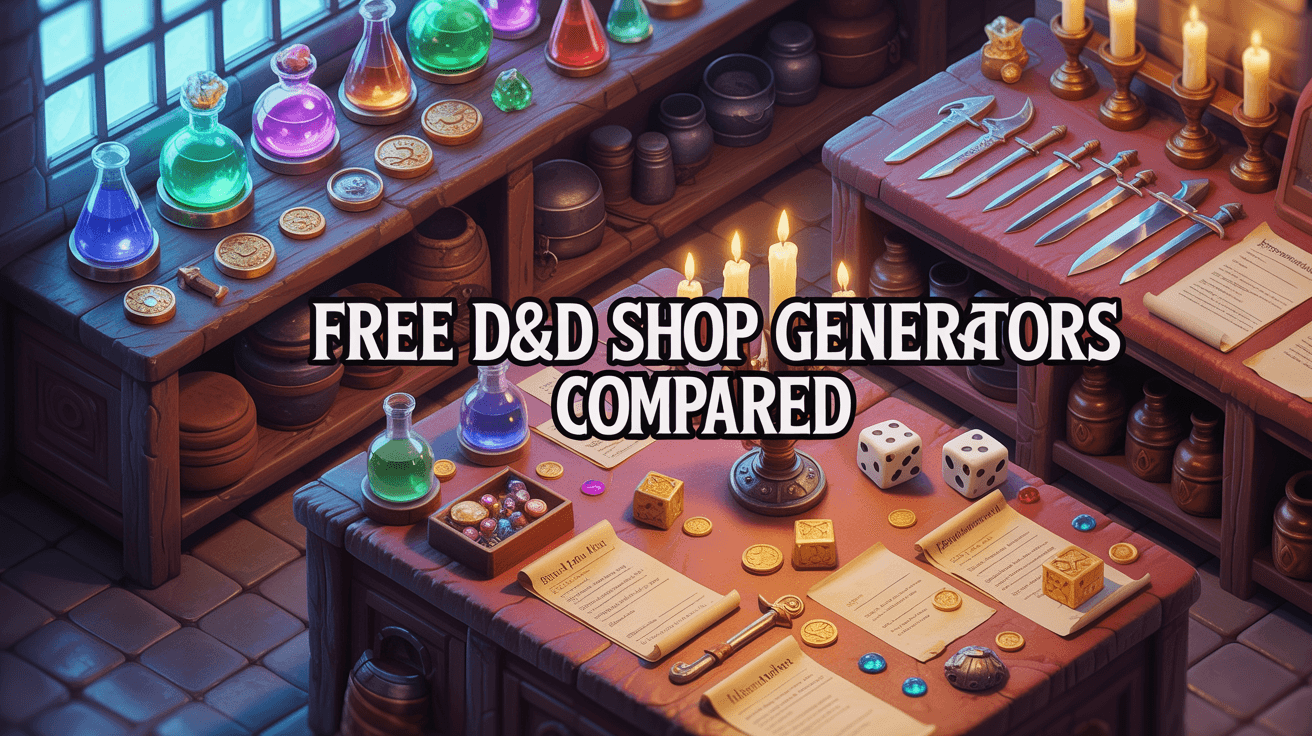
Free D&D Shop Generators Compared: CharGen vs Others
Compare free D&D shop generators in 2025. Learn which tools excel at customization, speed, and ease of use. Discover CharGen's strengths and limitations.
TL;DR: D&D shop generators save DMs from improvising inventory and pricing on the fly. CharGen offers AI-powered, context-aware generation with party-level scaling and shopkeeper personalities, and completely free. Legacy tools like Donjon, 5eMagic.Shop, and Roll For Fantasy excel at specific niches (reliability, transparent pricing, simplicity), but CharGen combines speed, customization, and comprehensive features in one tool.
Why Every DM Needs a D&D Shop Generator
Picture this: your party spontaneously decides to visit the enchanter's shop you mentioned offhand three sessions ago. Now you're scrambling to invent inventory, pricing, and a shopkeeper personality while your players wait expectantly. Sound familiar?
This scenario is why D&D shop generators have become essential free D&D tools in 2025. Rather than spending hours creating inventory lists during prep or awkwardly improvising prices mid-session, generators handle the tedious work so you can focus on storytelling. They enhance immersion by providing consistent, believable shops that feel integrated into your world.
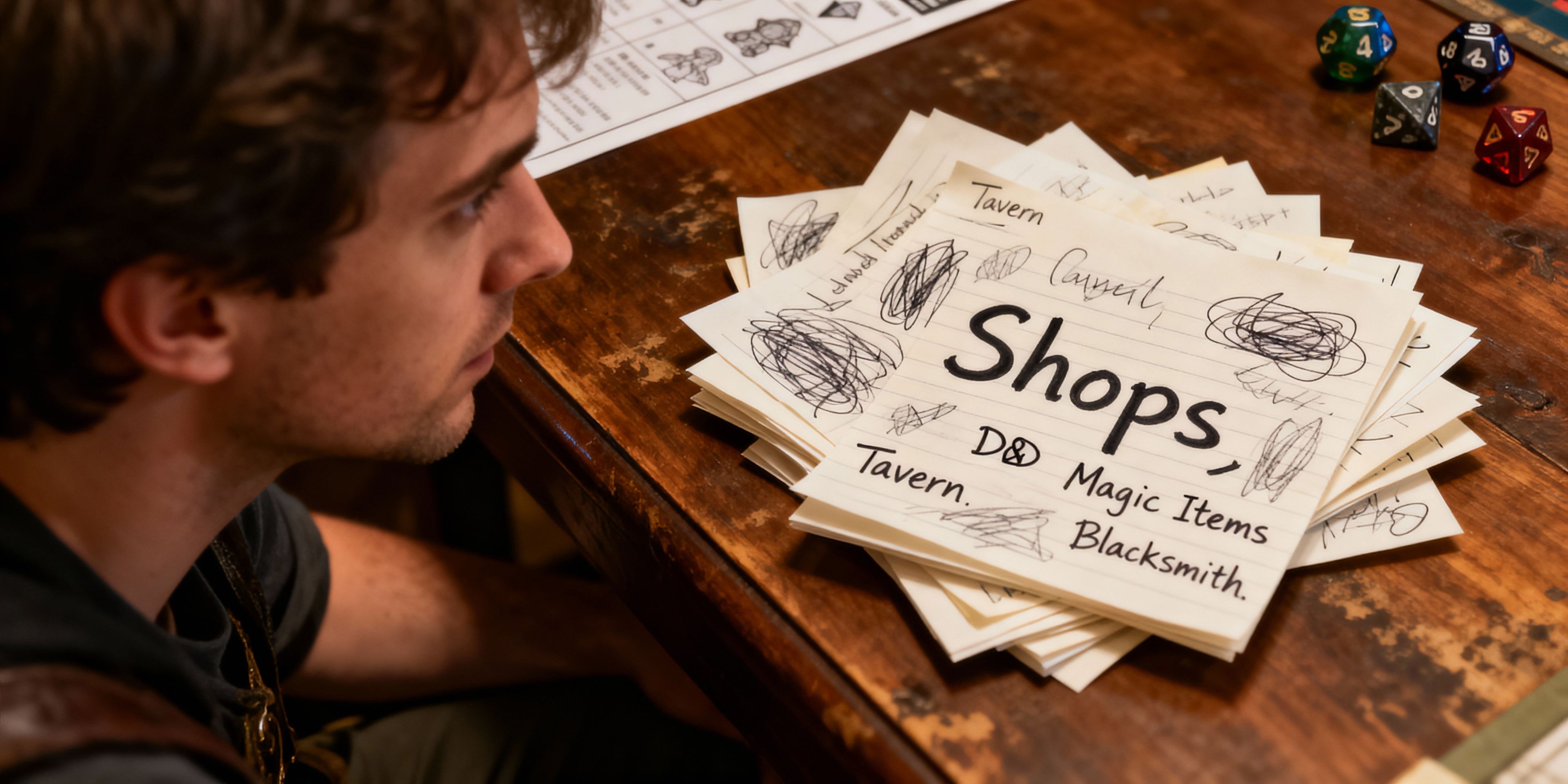
The free D&D shop generator landscape includes established options like Donjon, 5eMagic.Shop, and Roll For Fantasy alongside newer AI-powered tools like CharGen. Each takes a different approach: some prioritize transparent pricing methodologies, others focus on settlement integration or customization depth.
The Evolution of D&D Shop Generators: From Basic Tables to Context-Aware AI
Shop generation tools for D&D have come a long way since their earliest days. When DMs first looked for digital help creating merchant inventories, tools like Donjon and Roll For Fantasy built their followings through straightforward table-based random generation. Click a button, the tool rolls virtual dice, consults pre-programmed lists, and produces an inventory. These foundational D&D 5e resources worked reliably, but they treated every shop as an isolated entity with no connection to your campaign world or party composition.
That changed when CharGen's Shop Generator launched as an AI-powered alternative offering completely free, context-aware generation. Rather than consulting static tables, it considers factors like party level, regional themes, and automatically pairs inventories with shopkeeper personalities and backstories. This represents a fundamental shift in how shop customization works for DMs who need more than generic item lists.
Today, DMs choose between established table-based generators (5eMagic.Shop for its Sane Magic Item Prices methodology that rebalances DMG pricing, Kassoon for town integration features, Rolegenerator.com for settlement-specific generation) and newer AI-powered solutions. The decision comes down to specific priorities: how quickly you need shops during improvisation, whether pricing transparency matters more than narrative depth, what level of shop customization you actually need, and how deeply you want merchants integrated into your broader campaign.
Every generator tackles the same central problem with different solutions. Creating shops that feel authentic to your world instead of generic storefronts copied across every village requires different approaches. Some tools prioritize rapid generation for spontaneous session moments. Others focus on pricing consistency using established systems like Sane Magic Item Prices (which adjusts consumable costs and rebalances attunement items). Still others emphasize comprehensive world-building that connects shops to settlement demographics and regional economies. Understanding what each tool actually does well determines whether it saves you time or creates more work at your table.
CharGen: The New AI-Powered Contender
CharGen is the first AI-powered option that analyzes campaign context rather than pulling from static item tables. When you describe your party level, regional setting, or previous NPCs, it builds shops that feel like natural parts of your world instead of random collections of gear.
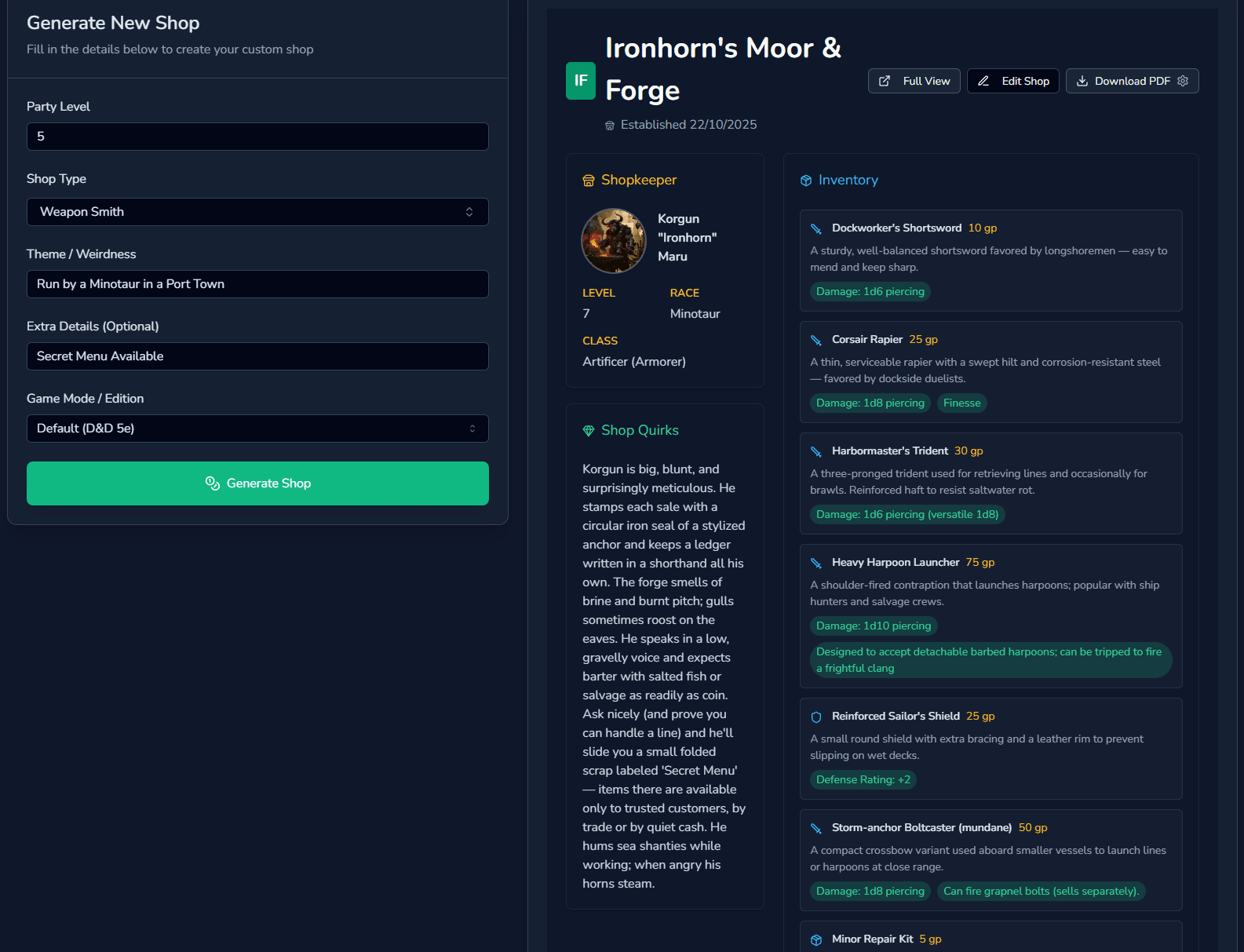
The tool is completely free for core shop generation. You get automatic party-level scaling that balances inventory to character power without manual calculations. A level 2 party sees appropriate starter equipment, while seasoned adventurers encounter items that match their capabilities. This removes the spreadsheet math that traditionally comes with maintaining progression balance.
Shopkeeper personalities come with roleplay suggestions, specific quirks, and backstories tied to regional themes. A coastal blacksmith might stock maritime equipment and have connections to shipping guilds. These aren't generic archetypes pulled from template libraries. The personalities connect directly to the location you've specified.
Thematic coherence links inventory, shop history, and geographic context. Items feel appropriate for the setting you've described. The shop's backstory explains why certain equipment appears on shelves. Everything connects logically rather than existing as isolated random elements.
The system supports multiple game systems beyond D&D 5e. Pathfinder, other d20 frameworks, and homebrew settings all work with the contextual intelligence. You can export everything as PDF files for in-person sessions without watermarks or download limits. Visual generation creates shop images you can share with players or import into virtual tabletops.
Most competitors restrict these features behind premium tiers. CharGen keeps them free. The only paid features involve advanced linking between NPC generators and town creation tools within CharGen's broader ecosystem.
Donjon restricts you to SRD content without individual item regeneration. 5eMagic.Shop focuses on pricing methodology but lacks inventory context. CharGen combines what those tools provide with contextual analysis, party-appropriate scaling, and integrated personalities through a modern interface.
Beginner DMs who want ready-to-use shops without learning complex pricing systems will find CharGen removes common friction points. You describe campaign context and receive a complete shop in seconds. No manual balancing. No generic randomization. No subscription gates.
Ready to generate your first shop? Try CharGen's free D&D shop generator and see how contextual intelligence changes prep time. Continue reading to see how legacy tools like Donjon compare for DMs who prioritize different features.
Donjon: The Legacy Workhorse
Donjon earned its place in D&D history through sheer reliability. DMs have trusted this D&D shop generator for years, and that familiarity creates powerful inertia. When you need a quick inventory list during session prep, Donjon delivers without learning curves or complicated interfaces.
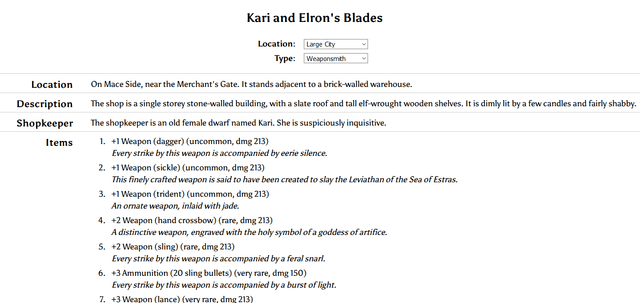
The trade-off? You're limited to SRD content only. That means basic magic items from the core rulebooks without the expanded options from Xanathar's Guide or Tasha's Cauldron. Your inventories work mechanically, but they lack the variety that makes shops feel distinct from each other.
The bigger limitation is Donjon's all-or-nothing approach. You get what you get with no individual item regeneration. If the generator produces three healing potions and a mundane longsword when you wanted something more interesting, your only option is regenerating the entire shop and hoping for better results.
Despite these constraints, Donjon remains the go-to choice for DMs who want proven reliability without bells and whistles. It's a no-frills generator that does exactly what it promises: produce functional shop inventories fast. For quick preparation or backup content during improvised sessions, that dependability matters more than advanced features.
Best for: DMs who want a quick, no-frills generator with proven reliability.
5eMagic.Shop: Transparent Pricing Methodology
5eMagic.Shop built its reputation on one specific strength: transparent, adjustable pricing systems that economy-conscious DMs can actually trust. While CharGen automates party-level scaling and Donjon delivers quick SRD inventories, 5eMagic.Shop focuses on the Sane Magic Item Prices system with clear calculation methodology you can verify and modify.
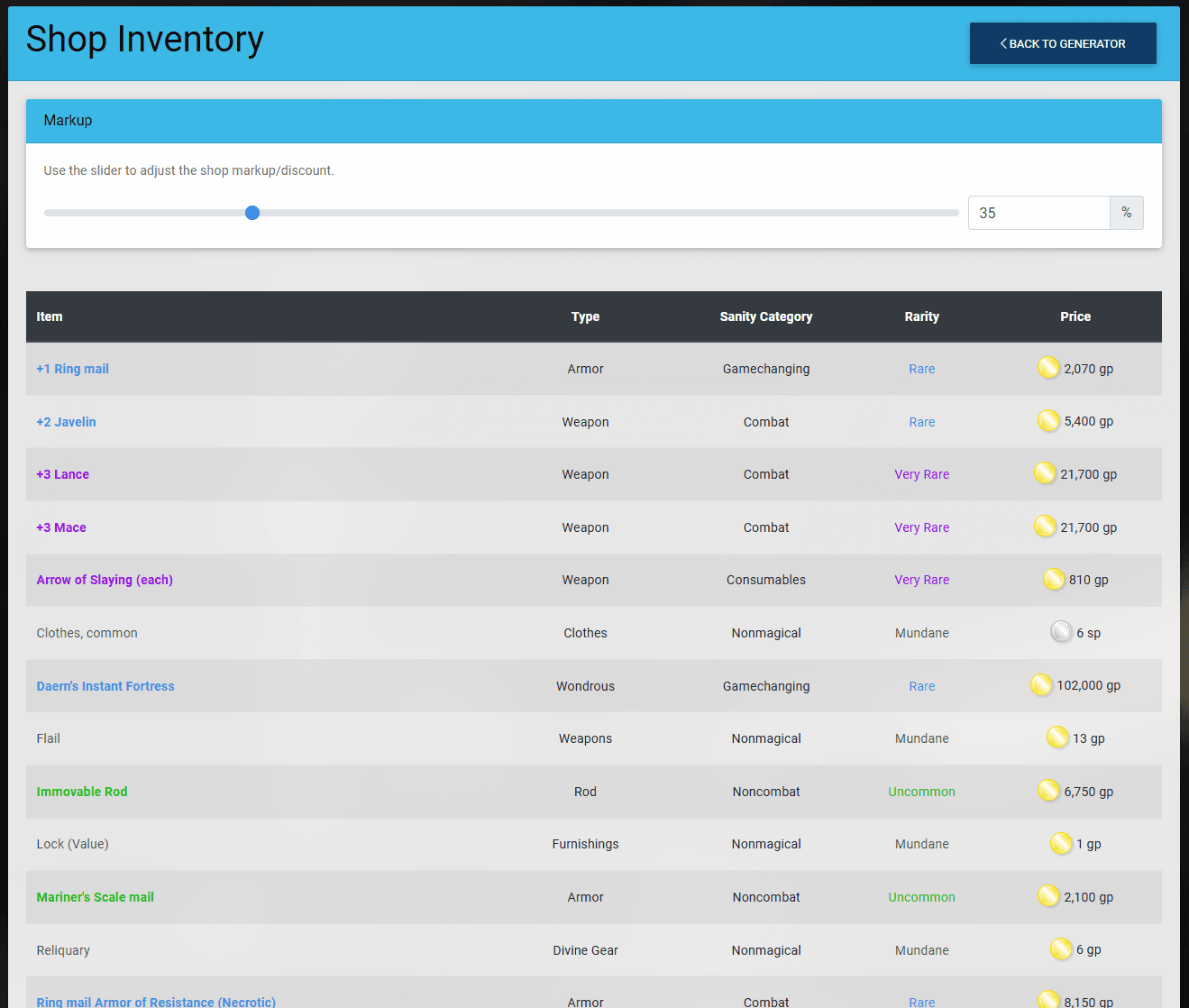
This matters more than it sounds. When your players ask why a +1 longsword costs 1,000 gold at one shop but 3,000 at another, you need consistent economic logic. 5eMagic.Shop shows exactly how it calculates prices and lets you adjust those variables to match your campaign's economy. That transparency prevents the pricing chaos that breaks immersion when gold values feel arbitrary.
The feature set stays basic compared to newer competitors like CharGen's AI-driven shopkeeper personalities or Kassoon's town integration. You get functional inventories with pricing you can defend, not rich narrative details or regional theming.
But for DMs running long campaigns where economic consistency matters, that pricing-focused approach beats fancy features. When your players start treating shops as strategic resources rather than narrative flavor, transparent methodology becomes essential.
Best for: DMs who need consistent, adjustable pricing systems with clear methodology.
Roll For Fantasy: Customization and Simplicity
Roll For Fantasy strikes a balance that many beginner DMs desperately need: enough customization to feel useful without the overwhelming complexity of advanced D&D shop generators. You can adjust parameters to match your campaign without drowning in options or learning specialized interfaces.
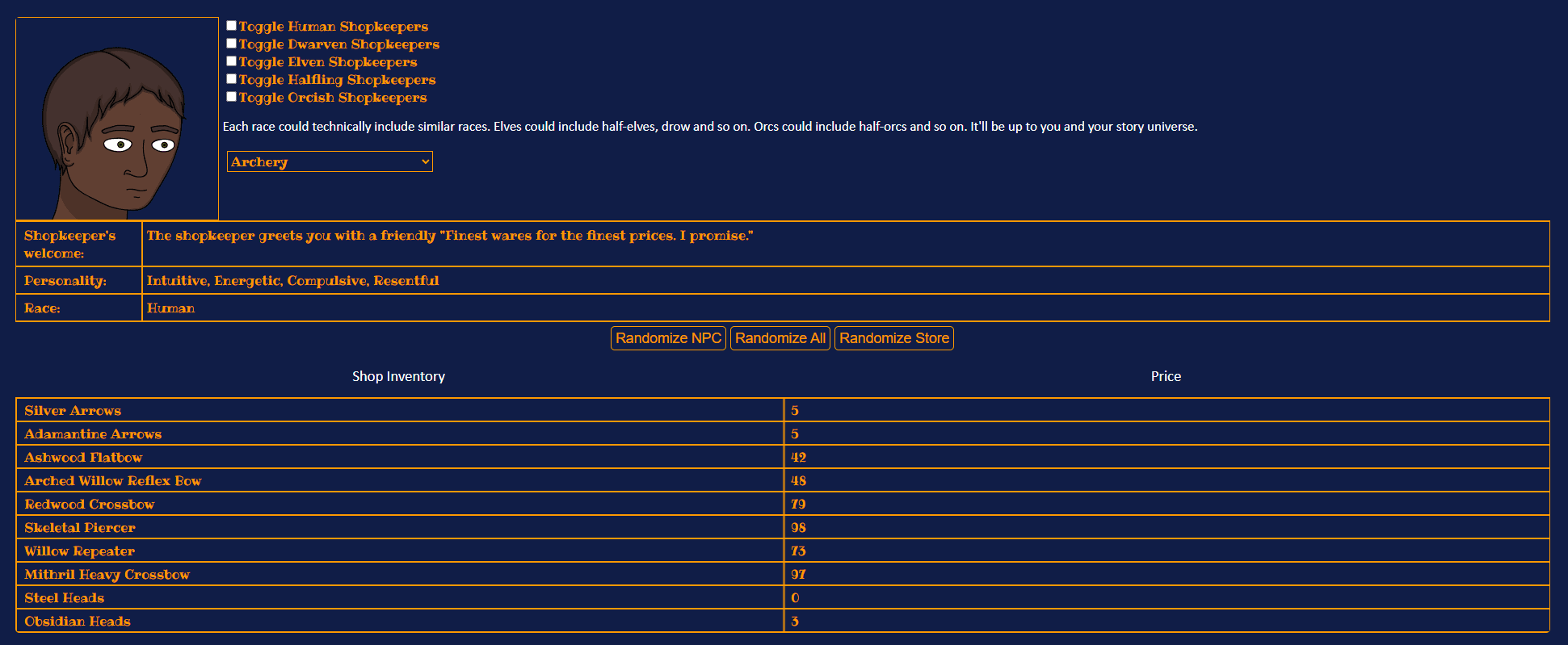
The standout feature is local saving functionality. Unlike web-only generators, Roll For Fantasy lets you save generated shops directly to your device for offline access. That matters when you're prepping at a coffee shop without reliable WiFi or running sessions where internet access isn't guaranteed.
The interface stays straightforward. New DMs can generate functional shops within minutes without consulting documentation or watching tutorials. You're not fighting with complicated settings or context menus when you just need a quick blacksmith inventory before tonight's session.
The limitation becomes obvious compared to CharGen's AI-driven contextual intelligence or 5eMagic.Shop's transparent pricing methodology. Shop customization options remain limited. You won't get the regional theming, party-level scaling, or integrated shopkeeper personalities that newer tools provide.
Roll For Fantasy serves DMs who value simplicity over sophistication. When you want customization without complexity and offline access without subscription fees, it delivers exactly that combination.
Best for: DMs who value simplicity and want to save generated shops locally.
Kassoon: Town-Building Integration
Kassoon takes a fundamentally different approach than inventory-focused D&D shop generators like Donjon or CharGen. Instead of treating shops as standalone entities with detailed item lists, Kassoon embeds them within comprehensive settlement-building tools where shops represent one component of a living town.
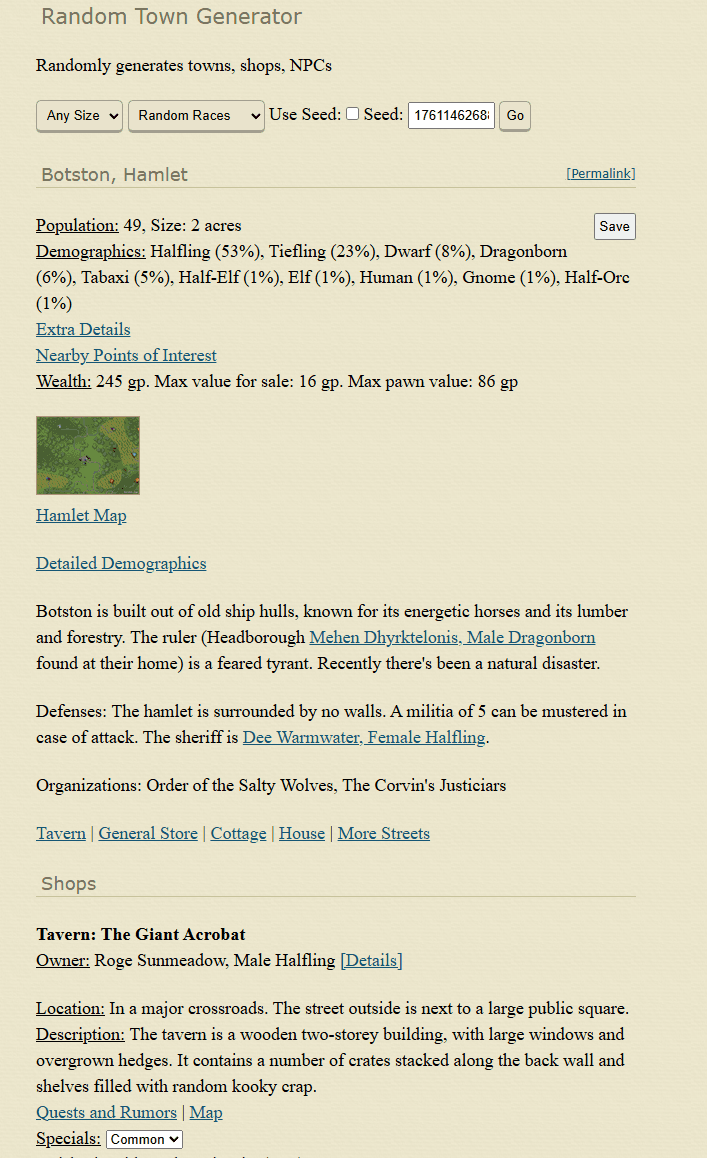
This settlement-focused design prioritizes narrative over granular inventory management. You get shops that feel integrated into broader town contexts rather than isolated storefronts. When you're building an entire fishing village or merchant city, Kassoon generates shops alongside taverns, temples, and government buildings to create cohesive settlements.
The trade-off is obvious: if you need detailed item-by-item inventories with party-level scaling like CharGen provides, or transparent pricing methodology like 5eMagic.Shop offers, Kassoon disappoints. Its strength lies in contextualizing shops within settlements, not providing comprehensive magical item catalogs.
Kassoon excels when town context matters more than individual shop mechanics. Building a campaign where the settlement itself is a character? Kassoon's integrated approach creates believable communities. Running a one-shot where you just need a magic shop's inventory? Other generators serve you better.
Best for: DMs building comprehensive settlements where shops are one component of larger town creation.
Rolegenerator.com: Settlement-Based Generation
Rolegenerator.com approaches D&D shop generation through settlement economics. Rather than treating every shop identically regardless of location, this generator scales inventory and pricing based on settlement size. A village general store automatically carries different stock than a capital city's specialized enchantment emporium.

This settlement-size scaling creates contextually appropriate shops without manual calculations. Your hamlet blacksmith won't mysteriously stock legendary weapons. Your metropolis magic shop won't feel identical to the roadside merchant three sessions ago. The generator considers economic context when building inventories.
The platform integrates shop generation with broader settlement creation features. Like Kassoon's town-building approach but with stronger inventory focus, Rolegenerator.com generates shops that reflect their settlement's economic capacity and population needs.
This matters most for DMs running sandbox campaigns where settlement economics drive worldbuilding. When your players visit progressively larger settlements, shops should reflect increasing sophistication and resources. Rolegenerator.com automates that progression without spreadsheets tracking settlement wealth levels.
The limitation appears when you need rich shopkeeper personalities or party-level scaling like CharGen provides. Rolegenerator.com prioritizes economic appropriateness over narrative detail.
Best for: DMs who want shops that automatically fit settlement economics and size constraints.
Key Comparison Criteria: What Really Matters
When evaluating D&D shop generators, certain features determine whether a tool actually saves time at your table or creates new frustrations.
Pricing systems diverge significantly across generators. DMG standard pricing, Sane Magic Item Prices, and flat-by-rarity models each handle economy differently. The best D&D shop generator for your campaign depends on whether you need transparent methodology (5eMagic.Shop) or automated calculations (CharGen).
Settlement-size scaling and regional context-awareness separate generic inventories from shops that feel integrated into your world. Tools like Rolegenerator.com and CharGen automatically adjust inventory based on location, eliminating manual calculations.
Rapid generation capabilities matter most during improvisation. When players unexpectedly visit a shop mid-session, speed beats customization depth.
Post-generation editing and customization options vary widely. Some free D&D tools lock inventories after generation, while others let you adjust individual items without regenerating everything.
Export functionality determines usability at actual tables. PDF downloads for in-person sessions or plain text for VTT integration make generated shops practical rather than decorative.
NPC shopkeeper generation with integrated personalities transforms functional inventories into memorable encounters. CharGen excels here compared to inventory-focused competitors.
Party-level balancing eliminates spreadsheet math by automatically scaling shop inventories to campaign progression.
Critical Limitations Across All Free D&D Shop Generators
Even the best free D&D shop generators share frustrating limitations that no tool has fully solved.
Content coverage remains restricted across the category. Most generators limit inventories to DMG content, excluding items from Xanathar's Guide to Everything or Tasha's Cauldron of Everything. Copyright restrictions prevent comprehensive 5e content inclusion, meaning your shops miss the expanded item variety that makes later sourcebooks valuable. CharGen, Donjon, 5eMagic.Shop, and competitors all face this constraint.
Export functionality varies wildly between tools. Some generators offer PDF downloads for in-person sessions. Others provide only screen views or basic text outputs. When you need printable shop inventories or VTT integration, this inconsistency forces workarounds.
The D&D Beyond gap surprises many DMs. Despite years of community feature requests, the official platform still lacks shop generation tools entirely. DMs expect integrated shop creation from the licensed 5e resource hub, yet the functionality remains absent.
Divergent pricing systems create inconsistency between tools. DMG standard pricing, Sane Magic Item Prices, and flat-by-rarity models produce wildly different costs for identical items. This makes switching between generators mid-campaign problematic without economic recalibration.
Limited customization in free tiers affects most platforms. Advanced features like custom item pools or detailed inventory editing often require premium subscriptions.
How to Choose the Right D&D Shop Generator for Your Table
The truth is simple: there's no universally "best" D&D shop generator. Your ideal tool depends on what actually matters at your table.
Choose CharGen if you want AI-powered speed with contextual coherence and minimal manual work. Party-level scaling, shopkeeper personalities, and regional theming happen automatically without spreadsheet calculations.
Choose 5eMagic.Shop if transparent pricing methodology matters for your campaign economy. When players question costs, you can show exactly how prices were calculated and adjust variables to match your world.
Choose Roll For Fantasy if you value simplicity and local saving over advanced features. Quick generation with offline access beats complexity when you just need functional shops fast.
Choose Kassoon if shops are part of comprehensive town-building efforts. Settlement integration matters more than granular inventory details when creating entire communities.
Choose Donjon if you want legacy reliability and don't need content beyond SRD. Proven dependability without learning curves serves DMs who prioritize simplicity.
Tips for Getting the Most from Any D&D Shop Generator
No D&D shop generator produces perfect results on the first try. Smart DMs treat generated content as starting points rather than finished products, though some tools require far less adjustment than others.
Start with CharGen for plug-and-play simplicity. Enter your party level and an optional theme (like "haunted village marketplace" or "desert trading post"), then generate your shop instantly. You'll get party-appropriate inventory, shopkeeper personalities with roleplay hooks, and shop backstories in seconds, completely free, no pricing adjustments needed. For beginners who just want to generate and run, this eliminates the manual work other tools require.
Adjust generated inventories to match your economy when using traditional generators. Tools like Donjon, 5eMagic.Shop, and Roll For Fantasy use different pricing systems (DMG standard, Sane Magic Item Prices, flat-by-rarity), so verify costs align with what you've established previously. If a +1 weapon costs 1,000 gold in one shop but 3,000 in another without narrative justification, your players will notice the inconsistency. CharGen handles this automatically by maintaining internal consistency across all generated content.
Edit after generation for maximum thematic fit. Replace generic items with location-appropriate alternatives. That coastal blacksmith should stock harpoons and fishing gear, not just longswords. CharGen's theming system handles much of this automatically, but you can always refine further based on your specific campaign needs.
Generate shops during prep for important locations, but keep CharGen bookmarked for improvisation. When players unexpectedly visit shops mid-session, speed matters more than perfection. CharGen's 30-second generation time makes it ideal for on-the-fly scenarios where you need something coherent immediately.
No Perfect Tool: But CharGen Comes Remarkably Close
The D&D shop generator landscape offers genuine options, but CharGen has emerged as the most complete solution available. The combination of AI-powered contextual generation, automatic party-level scaling, dynamic shopkeeper personalities with shop histories, and unlimited free use delivers innovation that sets it apart from established competitors.
Donjon and 5eMagic.Shop bring reliability and niche strengths, where transparent pricing methodology matters for economy-conscious campaigns, and legacy dependability serves DMs who want proven simplicity. But these tools lack the comprehensive feature set that makes CharGen shine: seamless NPC integration, regional theming, and contextual intelligence that eliminates manual calculations.
For most tables, CharGen will be the go-to D&D shop generator. It excels across multiple priorities simultaneously: fast generation for improvisation, extensive customization through context awareness, user-friendly interfaces, and the integration features DMs actually need. Experimenting with alternatives like Roll For Fantasy or Kassoon can help confirm CharGen fits your workflow best.
CharGen represents where D&D 5e resources are headed: comprehensive content coverage, intelligent automation, and seamless campaign integration that saves actual prep time.